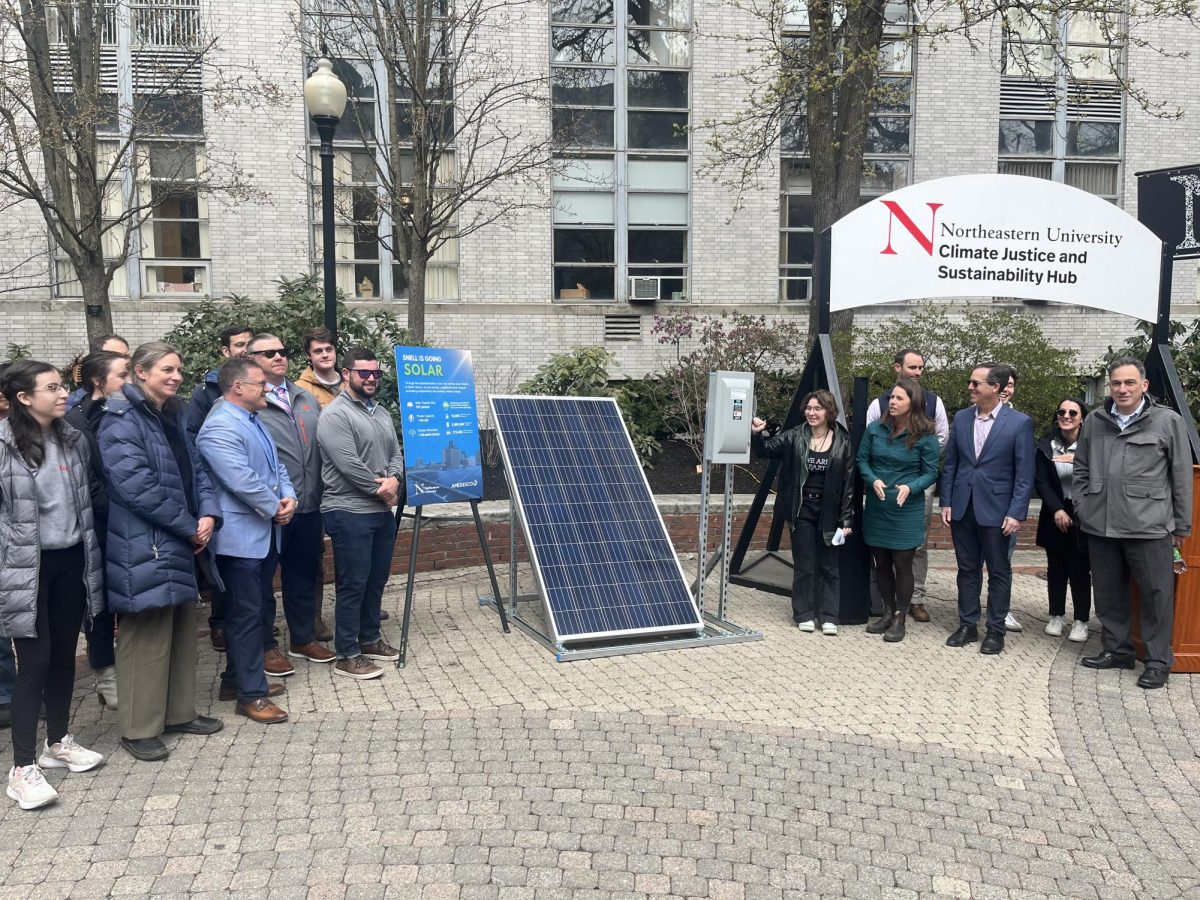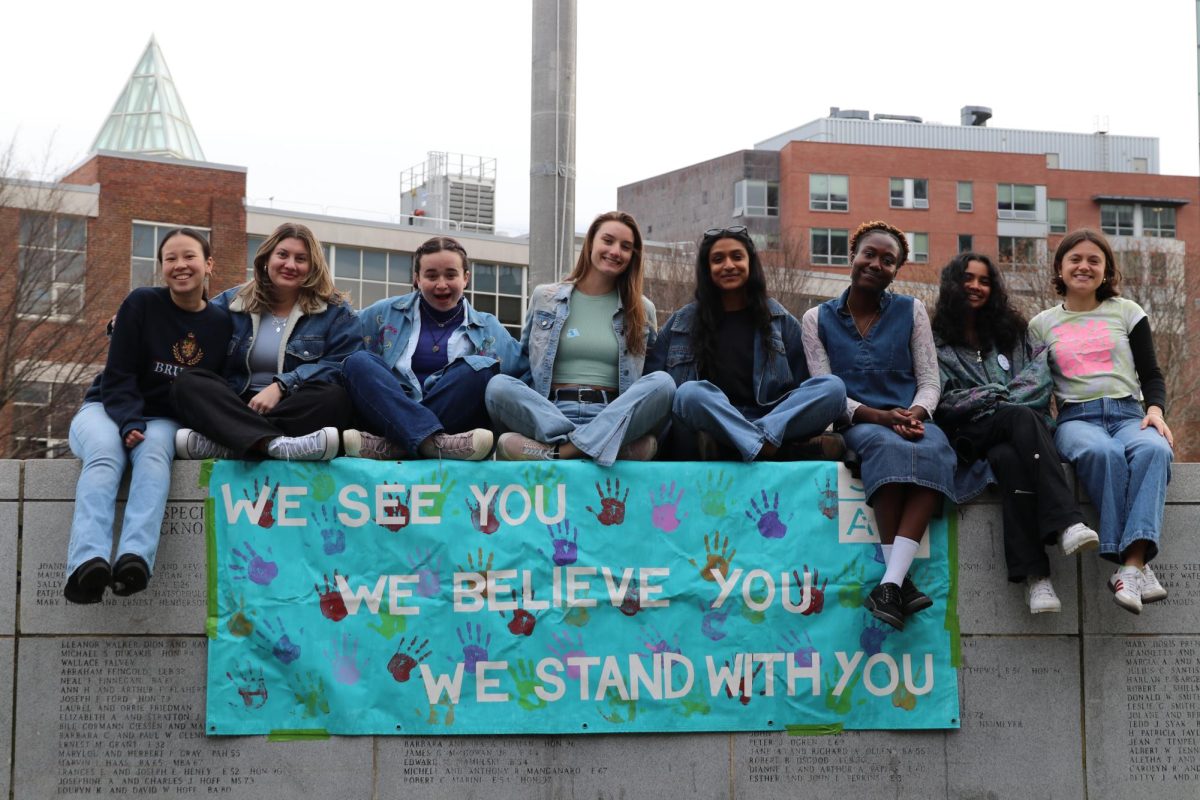By Miharu Sugie, News Staff

Six months into the Northeastern adjunct professors’ campaign to unionize, the effort has gained momentum as the Boston City Council unanimously passed a resolution April 4, urging Northeastern and other universities to support adjuncts and remain neutral in the election process. Northeastern adjunct Anne Fleche received the resolution alongside part-time professors from Boston University in the City Hall chamber.
Adjunct faculty members at Northeastern are part of a citywide campaign to improve their job security and benefits, usually offered only to full-time faculty. While the Northeastern part-time instructors gradually gained support on campus with groups like the Progressive Student Alliance and the Empower Adjuncts Community Coalition, the local community has also gradually shown support for the part-timers.
“It feels really good, thinking back, six months ago, it was still very difficult to talk about this on this campus,” D’Amore-McKim School of Business part-time lecturer Bill Shimer said. “It was just a hard issue to bring back and now that people are talking about it, it’s very easy to discuss so we can make our arguments for unionization in plain sight out to the rather than undercover of the darkness, in hiding and whispering.”
Several politicians have sent letters supporting adjunct unionization to President Joseph E. Aoun in the recent months.
Following Senator Elizabeth Warren, politicians including Second Suffolk District Senator Sonia Chang-Diaz, Representative Michael E. Capuano, congressmen and Committee on Education and the Workforce members John F. Tierney and George Miller, Second Berkshire district representative and Northeastern alumnus Paul Mark, State Senator Michael Moore and State Representative Tom Sannicandro have voiced concern over the election process.
Rep. Miller (D-Calif.) investigated the situations of adjunct faculty employed by higher education institutions in the US in his eForum and said that many contingent faculty members who commit to multiple courses are having great financial difficulty, forcing them to take part-time jobs or public assistance. In addition, he told The News in an email interview that many have very little support from the administration and peers in general, that many fear this will affect their students negatively.
“This, simply put, is unacceptable. No faculty should be struggling in these ways. They deserve pay and working conditions that adequately reflect the importance of their work,” Miller said. “Research has shown that organizing can lead to better working conditions, and can increase pay and benefits by 25 percent for contingent faculty. And like all workers, adjuncts have the right to advocate on their own behalf without the fear of interference or reprisal.”
When The News reached out to Northeastern’s administration for comment, Associate Director of Communications Kara Shemin declined to comment but recommended The News read Provost and Senior Vice President for Academic Affairs Stephen W. Director’s letter on Northeastern’s part-time faculty info website.
The Graduate Sociology Society (GSS), the History Graduate Student Association and the English Graduate Student Association (EGSA) released statements yesterday, urging Northeastern to recognize the contributions of adjuncts. GSS wrote that “in these challenging economic times and with rising costs of living, particularly in the city of Boston, there is a great need for a realistic living wage,” but with low wages, professors are forced to overwork themselves. The only way to move forward is to recognize the adjuncts’ voices, the graduate students collectively said in their statements.
“This is the best kind of investment the university can make,” the EGSA wrote.
As the union election date is approaching, these letters from politicians and support from students and the community are important catalysts to the campaign, reinforcing the fact that adjuncts should be the only ones to decide their fate, Fleche said.
Moore and Sannicandro wrote in their joint letter that as a leader in higher education, Northeastern’s administration should take this chance to “promote and foster a bedrock principle for which our state’s great post-secondary institutions are rightly known: freedom of thought, speech and action.” By allowing for a “transparent union election process,” Northeastern can achieve this, they wrote.
One particularly notable university that took a neutral stance is Georgetown University, Jonathan Huskey, a senior communications specialist for the Service Employees International Union, said. A university either remains neutral, as Georgetown did, or universities like Northeastern try to discourage employees from forming a union, Fleche said. She added that Northeastern is in a gray area; the university has hired Jackson Lewis, a law firm known for union-breaking, and sent emails that give adjuncts a feeling of dread and insecurity, but that is not exactly illegal, according to Fleche.
“Why is it better to pay lawyers and public relations people, than to pay teachers who teach the courses?” Jack Dempsey, an adjunct teaching English and media studies at Bentley University, said. “Increasing the wages of adjuncts is one of the best investments a university can make to better itself.”
It’s not just Northeastern that seems to contradict its message, Dempsey said. Bentley adjuncts last October lost their election to unionize, although the adjuncts were confident in a victory. Even though Bentley’s official website says it promotes “a sense of ethics, civic engagement, social responsibility and sustainability,” Dempsey said that the university contradicts itself by denying the adjuncts’ difficult financial situations and discouraging unionization.
Once adjuncts win a union election, the part-time professors gain a chance to bargain for a new contract, said Andrew Klatt, a Spanish adjunct professor at Tufts University. Tufts’s adjuncts voted in favor of a union last September.
This process, called collective bargaining, will take months, Klatt said.
From this long process, the George Washington University adjuncts were able to negotiate a new contract. With the new contract, Susan Ewing, a George Washington communications professor and one of the negotiators, said that adjuncts received 35 percent more in wages per three-credit course and protection of their jobs. The part-time lecturers also won some of the most basic privileges like the right to a supplemental retirement plan and medical leaves of absence, that full-time faculty have. Now, Ewing can go to academic conferences through the professional development fund and even access resources and facilities like the campus internet, printers, computers, gym and pool.
“It really makes a huge difference in your ability to talk about things,” Ewing said. “One of the things that matters the most to both faculty and students is being able to express the ideas that are relevant to the course and freely, not worrying about what you say, that you’ll insult one of the full-time faculty members, or lose your job.”
“The administration at Tufts also opposed the union from the beginning but not as aggressively as Northeastern,” Klatt said.
However, Klatt said, both administrations have said that the union would be an outside force that would come between the administration and the faculty.
“Of course that is not the case because we the members are the union,” Klatt said. “But the attitude of the administration has not changed.”
Although the administration seems to want the adjuncts to remain invisible, Klatt said the “invigorating process of democratic participation” has bridged the distance between the adjuncts, tenured faculty, students and alumni, Klatt said. According to Klatt, administrations do not realize that the resulting contract will provide a framework, a set of enforceable rules written in stone, for present and future working relationship between the administrators and the part-time instructors.
“It’s important for the administration at Northeastern, and university administrators in schools across the country, to listen to the voice of the adjuncts they employ because their work is critical to universities, to students’ education, and to our nation’s future,” Miller said.
The National Labor Relations Board recently sent a reminder to all eligible voters about the upcoming union election.
“It’s been a long, busy union winter,” Fleche said.
And Shimer added that now is the time to get this done.













